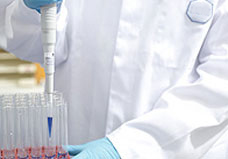| |
 |
|
|
|
|
|
|
Huntington's disease |
|
|
What is
Huntington's Disease?
Huntington's disease (HD) results from genetically programmed
degeneration of brain cells, called neurons, in certain areas of
the brain. This degeneration causes uncontrolled movements, loss
of intellectual faculties, and emotional disturbance. HD is a
familial disease, passed from parent to child through a mutation
in the normal gene. Each child of an HD parent has a 50-50 chance
of inheriting the HD gene. If a child does not inherit the HD
gene, he or she will not develop the disease and cannot pass it to
subsequent generations.
A person who inherits the HD gene will sooner or later develop the
disease. Whether one child inherits the gene has no bearing on
whether others will or will not inherit the gene. Some early
symptoms of HD are mood swings, depression, irritability or
trouble driving, learning new things, remembering a fact, or
making a decision. As the disease progresses, concentration on
intellectual tasks becomes increasingly difficult and the patient
may have difficulty feeding himself or herself and swallowing.
The rate of disease progression and the age of onset vary from
person to person. A genetic test, coupled with a complete medical
history and neurological and laboratory tests, helps physicians
diagnose HD. Presymptomic testing is available for individuals who
are at risk for carrying the HD gene. In 1 to 3 percent of
individuals with HD, no family history of HD can be found.
What research is being
done?
Scientific investigations using electronic and other technologies
enable scientists to see what the defective gene does to various
structures in the brain and how it affects the body's chemistry
and metabolism. Laboratory animals are being bred in the hope of
duplicating the clinical features of HD so that researchers can
learn more about the symptoms and progression of HD. Investigators
are implanting fetal tissue in rodents and nonhuman primates with
the hope of understanding, restoring, or replacing functions
typically lost by neuronal degeneration in individuals with HD.
Related areas of investigation include excitotoxicity
(over-stimulation of cells by natural chemicals found in the
brain), defective energy metabolism (a defect in the
mitochondria), oxidative stress (normal metabolic activity in the
brain that produces toxic compounds called free radicals), tropic
factors (natural chemical substances found in the human body that
may protect against cell death)
|
|
|
|
Huntington’s disease - treatment of
Huntington’s disease, Huntington’s disease types, Disease medicines,
Huntington’s disease symptoms, Huntington’s disease and Disease symptoms,
Huntington’s disease symptoms Disease and diagnosis, Symptoms and Solutions,
Signs and Symptoms, type of Huntington’s disease, cause common, common
Huntington’s disease, Huntington’s disease List, causes list, Infectious
Huntington’s disease, Causes, Diseases , Types, Prevention, Treatment and
Facts, Huntington’s disease information, Huntington’s disease: Definition,
Huntington’s disease names, medical Huntington’s disease, medical
Huntington’s disease and disorders, cell Huntington’s disease, Huntington’s
disease Worldwide, Huntington’s disease Research, Huntington’s disease
Control, Huntington’s disease Center, Digestive Huntington’s disease Week,
Information about Huntington’s disease, causes of different Huntington’s
disease, Huntington’s disease Articles, Huntington’s disease and conditions,
Health and Huntington’s disease, Huntington’s disease Patients, Huntington’s
disease and Sciences, causes of alzheimer's Huntington’s disease,
Huntington’s disease causes, alternative medicine heart Huntington’s
disease, body ailments, Huntington’s disease medicines, medical antiques,
type of blood Huntington’s disease |
|
|





